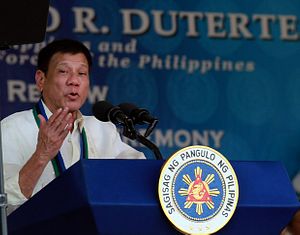Cheering Philippine President Rodrigo Duterte and his crackdown on drug dealers with a shoot first policy has reached worrying levels. State-sanctioned killings, once shunned as illegal, seem to be legitimized by police and supporters alike, while his trust rating continues to sit at 91 percent.
A lack of criticism is also telling and evident in some sections of the media as the killings near 2,000. For instance, a glowing cover shot of Duterte on the cover of Time with the caption “Why Rodrigo Duterte is The Philippines’s new leader” suggests democracy has spoken.
Time then delivers an in-depth report on the killings drawing parallels with a similar killing-spree of drug dealers by former Thai Prime Minister Thaksin Shinawatra in 2003.
Particularly chilling, however, was the BBC report and a series of interviews with hired guns who shoot people in the back of the head– as captured by video – and spoke with journalist Jonathan Head openly about how the system works.
“One time, they needed a woman… my husband tapped me to do the job. When I saw the man I was supposed to kill, I got near him and I shot him,” she said.
Asked who gave the orders, she replied: “Our boss, the police officer.”
Frustrations with the inability of the authorities to deal with crime are understandable, particularly in the media where journalists are at their wits end with the courts and their inability to find justice for the 58 people slaughtered allegedly by the Ampatuan family in Maguindanao seven years ago.
Thirty-four of them were journalists in what was labeled the worst act of election violence in Philippine history and the single deadliest incident for journalists the world had known until then.
But civilian crime is one issue, while civil war and the Abu Sayyaf is a different matter altogether. Duterte has now shifted his deadly focus onto the insurgents he actually says he once admired.
He now wants them eliminated following a change of heart which he says came after they “started slaughtering people like chickens”.
This group of thugs dressed up as Islamic militants has declared war against Manila and the Filipino people on regular basis since the 1990s. It has also sworn allegiance to the Daesh, or Islamic State, and has apparently expanded beyond its borders into Malaysia.
Their kidnap and ransom policies and the beheading of their victims – such as two Canadians and an 18-year-old local this year alone – is also highlighting an inability by the Philippine military to effectively deal with the menace.
“Kill them, destroy them,” Duterte told the police and military late last week, adding his country had the ability to finish the group within a week.
As a fighting force, the Abu Sayyaf are a low-grade terrorist outfit who generally prefer soft targets.
But they have proved effective in controlling islands, such as Jolo off the southern Philippines, a major impediment to trade, tourism and helping to ensure that more than a million Filipinos who have lived as refugees in squalid conditions in East Malaysia for three generations are unable to return home.
This is one target that Duterte can afford to hunt down and terminate while justifying his actions under the law as opposed to cutting down low level drug dealers, often addicts themselves, and petty street criminals.
As unpalatable as it might sound to the purists, an end to the Abu Sayyaf would probably mitigate the state crimes Duterte has initiated against the urban thugs of Manila and the provincial cities and give the headline writers a genuine reason for applause.
Even a Catholic bishop in the southern Philippines is backing Duterte on this issue.
“The Abu Sayyaf is a terrorist group and it is not for dialogue,” said Bishop Martin Jumoad of the Prelature of Isabela in Basilan province. “They must be destroyed … dismantled and apprehended.”
Such support should be welcomed. But with Duterte’s trust factor running at more than 90 percent, other people’s opinions simply may not matter.
Luke Hunt can be followed on Twitter @lukeanthonyhunt

































